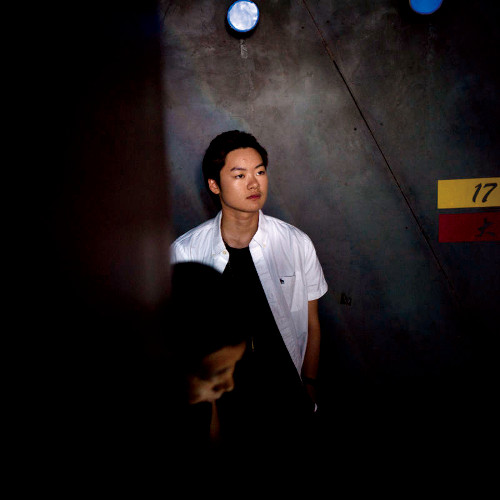Meet Hitomi. His father is Japanese and his mother is Chinese. He goes to international school in Beijing, plays baseball, and wants to study medicine. He also has a twin sister. Last year, for his 16th birthday, his parents paid for him to begin hormone replacement therapy.
Hitomi was born female but identifies as male. He is kuaxingbie, or as it’s known in English: transgender. The World Health Organization defines transgender as “[a] term for people whose gender identity and expression does not conform to the norms and expectations traditionally associated with the sex assigned to them at birth.” Hitomi offers a more succint definition: “Kuaxingbie means you don’t accept your body parts.”

Transgender is often described as an umbrella term because it includes those who identify as gender queer (otherwise known as gender fluid) and bi-gender. It can also be broadly defined to include cross-dressers and drag. Its all-encompassing definition means it’s incredibly difficult to quantify the number of people in China identifying as transgender.
Traditionally, transgender people have faced discrimination, owing in part to the fact that China has no specialized anti-discrimination law – and awareness surrounding the issue remains low.
There are hopes within the Beijing trans community that attitudes are changing, however. The last couple of years has seen an increase in the visibility of trans people and issues, with the likes of former Olympic champion Caitlyn Jenner, Orange is the New Black star Laverne Cox and, in China, the male PLA dancer turned popular female television host Jin Xing. Together, they represent the more commonly known version of trans, that is, a person who was born as male but identifies as female, and vice versa. However, there are many trans people who, rather than fit neatly into a binary mold, oscillate between the two or lie somewhere in the middle.
Awareness of the definition is crucial in helping to foster a wider understanding, according to executive director at the Beijing LGBT Center, Yingxin.
“There’s not only two genders – and we should respect that difference,” she says. “It’s very important to let people know about transgender [issues], because there are myths about transgender people, even within the trans community.”
Yingxin explains that among Beijing’s own transgender groups, a significant number of people believe that only those who undergo surgery are ‘real’ transgender. “Many people still think transgender people all want to change their [birth] gender but that’s not true.”
For Hitomi, it was “always the case” that he identified as male. “My mother told me a story that when I was a child, like three or four years old, I cut my hair by myself.”
He doesn’t remember the incident, but the way he tells it, the story is a reflection of his true identity asserting itself. “You know, nobody knows why some people are transgender. Some people say it’s caused when you’re in your mom’s body – the hormones – others say it’s your environment. It’s the same as why some people are gay.”
Hitomi didn’t really ‘come out’ as transgender so much as he was ‘found out.’ While surfing online two years ago, he accidentally used his parent’s email address to log into transgender and LGBT websites. His mother asked if he was a lesbian. “I told her I was transgender [but] she’d never heard about this before. In China nobody hears about it.”
It may be more accurate to say that Chinese trans culture is ‘seen but not heard.’ Examples of what today’s society would call transgender appear throughout Chinese history as far back as the Ming Dynasty. Peking Opera often featured male actors playing female characters and the female warrior Mulan was also a cross-dresser (though it remains hotly debated, especially within current trans circles, as to whether these people would today self-identify as trans or whether they were simply forced into their roles as a result of patriarchy and other social forces).
Hitomi’s mother, believing that her son was simply confused, told him that he would become “better in the future,” a common refrain of parents in China. But after several visits to a psychologist (who declared Hitomi was indeed transgender) and a visit to the hospital to check his chromosomes (which were “ordinary”), Hitomi’s mother made a concerted effort to better understand her son’s identity – eventually offering consent for him to begin hormone replacement therapy (HRT) in Japan last year.
Hitomi cites the quality of the therapy in Japan as a deciding factor in the decision to go ahead with the procedure.
“The Chinese [HRT] has many more adverse effects.” Hitomi self-injects at home every three weeks and will continue to do so indefinitely. There are side effects such as increased acne and an oily complexion, but Hitomi is content. He is confident he will later undergo sexual reassignment surgery (SRS), also in Japan.
“If you want to change your gender [on your Japanese identity documents], you must do the surgery. It’s the only way. Besides, they don’t have good hospitals in China. The government is confused and they don’t yet have sure policies for SRS,” he explains.
Hitomi’s willingness to discuss his personal life has led to invitations from Beijing colleges and universities to speak about his experiences. He’s eager to help educate young people in order for them to better understand themselves.
“In terms of population, China should have more transgender people than anywhere else in the world,” he says. “So why aren’t they more obvious? It’s because they don’t know they are trans, or don’t have the right language or support to self-define.”
Hitomi’s outreach work has led him to become an active member in the Beijing trans community – and a regular at the Beijing LGBT Center. The Center was established in 2008 and located on the 26th floor in an apartment block in Liufang. Faced with casual discrimination on a daily basis, the Center has become a popular place of refuge among the city’s trans community. Bookshelves filled with LGBT-friendly books and films line the sunshine yellow walls, while the smaller rooms are set with comfy couches. Hitomi goes to the Center every Thursday to meet friends and organize trans events. “In China, gay and lesbian culture is [getting] much bigger. Now we have more transgenders so we should think of some of our own events.”
Hitomi is a popular figure, not only among the LGBT community but also outside of it. He admits that he’s lucky not to have experienced any “genuinely negative” reactions regarding his gender identity – and attributes this to his age (“we’re children, nobody cares about us”) as well as the fact that he attended a Japanese school from grades one to six.
“My friends wouldn’t say anything to me. I played soccer with the boys and they’ve known me since I was a child. It depends on your personality. If I was in Chinese school I might have faced discrimination, but in international school and Japanese school they even have a LGBT transgender class.”
Such classes may soon become part of Chinese schooling too, as the Chinese Ministry of Education will pilot courses on sexuality by the end of next year.
Campaigners hope that the courses, if fully implemented, would pave the way for more open discussion among Chinese youth. Yingxin from the LGBT Center agrees: “In metropolitan cities, generally speaking, people are more queer-friendly, however, it depends on their age. The younger generation is more likely to have higher acceptance. Society needs time to adjust.”
This process can be slow, as China’s gay campaigners can attest. Homosexuality was only formally removed as a mental illness from the Chinese Classification of Mental Disorders in 2001 – and although mainstream public attitudes have grown more tolerant in the intervening years, prejudices continue to linger.
Currently it’s not illegal to be transgender in China, but non-conforming gender identities are still pathologized as mental disorders. If a transgender person requests a sex change, the standard procedure is that doctors first require the person to undergo a minimum of one-year’s psychological treatment in an attempt to ‘cure’ the desire. Those who seek HRT treatment or SRS surgery at public hospitals, must first provide proof they have completed the year-long evaluation. As a result, many trans people in China prefer private clinics, or seek treatment abroad in places such as Japan, South Korea and Thailand.
Beijing-based office worker Ran Ran, 27, has spent the last several years exploring this official route. When Ran Ran, who was born female, expressed homosexual-like tendencies at age 18, his mother took him to their local hospital for a mental assessment. “The doctor said I was a lesbian. In China, homosexuals aren’t seen as mentally unwell, but kuaxingbie are.”

Ran Ran, originally from Anhui, describes himself as a third sex: 70 percent man, 30 percent woman. “But in China, for practical reasons, you often have to be either one or the other, so I chose male.” He has used male washrooms for the last three years. “Now almost everything I do is male-oriented.” He describes this situation as “troublesome.”
Ran Ran began HRT in August in Beijing, though he prefers not to disclose where. He says his voice has deepened considerably and smiles when mentioning his faintly visible moustache. He plans to have breast removal surgery in the future. “Breast removal is about 20 or 30,000 yuan, but the entire female surgery is about 400 or 500,000 yuan at least.”
The cost is high and not solely monetary. “I want to have my own baby before I’m 30. After that I will have breast removal surgery,” says Ran Ran, who hopes to become pregnant himself. In this instance he will stop receiving HRT for six months to avoid any possible ill effects. But if necessary, he is willing to look at surrogacy options abroad. Although possible to arrange, gestational surrogacy is prohibited in China.
Ran Ran has a strong sense of self and feels that complete SRS is unnecessary. As in Japan, an individual in China must complete the procedure to change the gender marked identity on their national identification. The regulations were tightened in 2009, introducing stipulations such as being over the age of 20, and providing proof of having identified as trans for at least five years. There are no official statistics of the number of people who have had SRS in China.
Ran Ran’s decision not to undergo full SRS is due less to government restrictions (“the criteria aren’t law and people find ways to get around it, anyway”) and more the result of family pressures. He stresses that while Chinese parents can learn to accept their daughter dressing masculine, they cannot accept their child physically changing genders.
Echoing Hitomi’s experience, he explains that “Chinese people think that if you wait until you’re older, you’ll change. They tell me that when I’m 30, I’ll change my mind.” While it’s clear that Ran Ran plans to alter parts of his physical appearance, “changing” his mind is not part of the package. Ultimately, Ran Ran doesn’t see himself as a trans activist, “but I hope that at least I can use my experience to inform others who may be unaware of trans issues or people.”
Another person making an impact in the Beijing trans community is fashion store owner Xiaomi. The 30-something, whose shop, Equal, stocks imported Italian shoes, vintage style clothing and a range of sex toys, uses profits from sales to help support LGBT initiatives. Her store, in the Houhai area of Beijing, is emblazoned with the slogan ‘Proud All Of You,’ and aims to be the first retailer in China to sell clothes tailored for the LGBT community.
“A lot of people are not very happy. I understand this myself,” explains Xiaomi.

Sporting towering high heels and a long dress, her confident appearance gives no indication of her long personal battle for self-acceptance. Xiaomi first began to experiment with changing her look to appear more feminine after arriving in Beijing in 2009.
“I realized this was more comfortable for me. It was very relaxing to finally be myself,” she explains.
Xiaomi’s friends already knew she was sexually attracted to men and were quick to accept her new look. “But my mother has never seen me dress like this and doesn’t know I am attracted to men.”
She thinks that people in her hometown in Shanxi wouldn’t understand. “Even in Beijing, if I wear a skirt, when I’m walking down the street older people can be very abusive. I used to get annoyed and be angry, but now I don’t care. I can’t be liked by everyone.”
Xiaomi categorizes herself as gender fluid and hasn’t had SRS. She states reasons like the ongoing government therapy, bad technology, and reduced life expectancy, as well as the fact that she’s happy the way she is. “I’m really enjoying the status of being different characters in front of different people. In front of family I can be a good boy, in front of friends I can be myself.”
Although Xiaomi laments the incompleteness of transgender legislation, such as anti-discrimination and surrogacy laws, she is ultimately positive about the future, believing that “sooner or later” changes for the better will happen.
“It’s still very controversial in China. If there’s a program on TV talking about this, it might be banned, but in Western countries it’s OK. The media is strict, but it’s getting better, slowly.”
At Beijing’s first openly gay bar, Adam’s, there is a similar sense of optimism. It’s Saturday night and Adam's is holding its monthly Drag Queen event. The bar staff are dressed in slinky dresses and Sia-inspired wigs, while co-owner Mondo Wang is almost unrecognizable in make-up, heels and a body-hugging white dress (“Drag is something fun, but not in the heels, my god, it hurts so much”).
Backstage, make-up artists apply eye shadow to one of the event’s ‘queens,’ while Beyonce, Rihanna, and Gnarls Barkley’s ‘F*ck You’ blast from the speakers. “Anyone can come to this bar. You’re bullied outside, you’re protected and loved here,” says Mondo, before introducing us to his friend Deng.
Known tonight as ‘Dana,’ 20-something Deng identifies as a straight male, but enjoys wearing women’s clothing. Tonight marks his first public drag performance. His parents don’t accept it, “but I feel good and it’s funny and makes me happy… [I can] change myself and try different things. I respect transgender people – it’s a personal decision.”
According to Mondo, his transsexual friends are, “the best people I’ve ever met in this world [because] they think carefully but do things with a big heart.” He’s hopeful about transgender rights in the future. “People are changing, Beijing is changing. Twenty years ago Beijing was a completely different city, and now look at it.”
Photos by Holly Li






















0 User Comments